【最高考】2016届高考英语语法精讲精练 专题七 情态动词和虚拟语气常考点
高三英语高考语法知识点归纳总结情态动词和虚拟语气情态动词
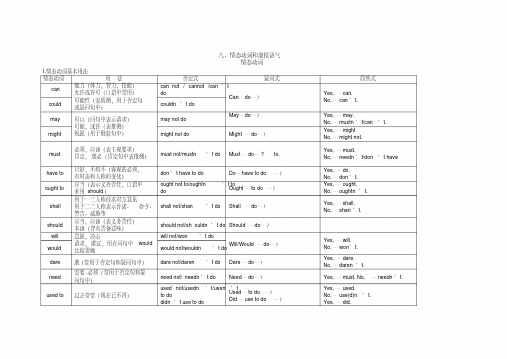
八、情态动词和虚拟语气情态动词I.情态动词基本用法情态动词用法否定式疑问式简答式can 能力(体力,智力,技能)允许或许可(口语中常用)可能性(表猜测,用于否定句或疑问句中)can not / cannot /can’tdoCan…do…?Yes,…can.No,…can’t.could couldn’t domay 可以(问句中表示请求)可能,或许(表推测)祝愿(用于倒装句中)may not doMay…do…?Yes,…may.No,…mustn’t/can’t.might might not do Might…do…?Yes,…might No,…might not.must 必须,应该(表主观要求)肯定,想必(肯定句中表推测)must not/mustn’t do Must…do…? to.Yes,…must.No,…needn’t/don’t havehave to 只好,不得不(客观的必须,有时态和人称的变化)don’t have to do Do…have to do…?Yes,…do.No,…don’t.ought to 应当(表示义务责任,口语中多用should)ought not to/oughtn’t todoOught…to do…?Yes,…ought.No,…oughtn’t.shall 用于一三人称征求对方意见用于二三人称表示许诺、命令、警告、威胁等shall not/shan’t do Shall…do…?Yes,…shall.No,…shan’t.should 应当,应该(表义务责任)本该(含有责备意味)should not/sh ouldn’t do Should…do…?will 意愿,决心请求,建议,用在问句中would比较委婉will not/won’t doWill/Would…do…?Yes,…will.No,…won’t.would would not/wouldn’t dodare 敢(常用于否定句和疑问句中)dare not/daren’t do Dare…do…?Yes,…dare. No,…daren’t.need 需要,必须(常用于否定句和疑问句中)need not/needn’t do Need…do…?Yes,…must. No,…needn’t.used to 过去常常(现在已不再)used not/usedn’t/usen’tto dodidn’t use to doUsed…to do…?Did…use to do…?Yes,…used.No,…use(d)n’t.Yes,…did.No,…didn’t. II.情态动词的重点知识表示“能力、许可”的can和may 表示能力的情态动词用can/couldA computer_____think for itself; it must be told what to do.A.can’tB.must n’tC.may notD.might not表示许可时用may/might ,can/could 都可以,但在问句中用could…?或might…?以使口气委婉客气,其回答一定要用can或may,以使回答口气明确(must表示一定,必须,mustn’t表示禁止,不许可)。
历年高考英语语法精讲精练-情态动词和虚拟语气有解析.doc
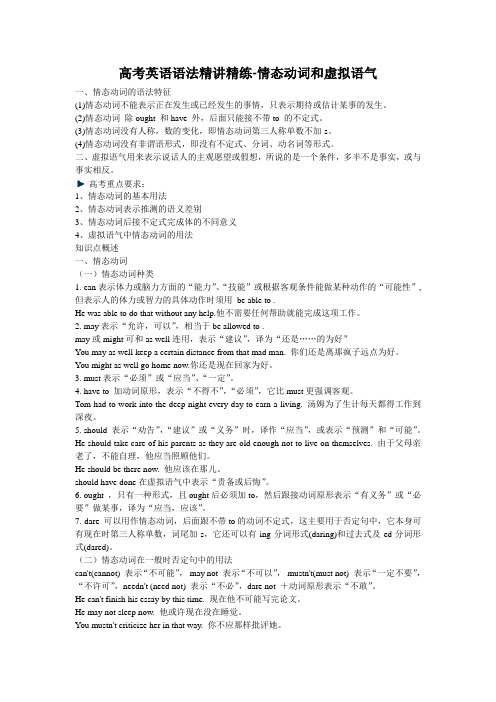
高考英语语法精讲精练-情态动词和虚拟语气一、情态动词的语法特征(1)情态动词不能表示正在发生或已经发生的事情,只表示期待或估计某事的发生。
(2)情态动词除ought 和have 外,后面只能接不带to 的不定式。
(3)情态动词没有人称,数的变化,即情态动词第三人称单数不加-s。
(4)情态动词没有非谓语形式,即没有不定式、分词、动名词等形式。
二、虚拟语气用来表示说话人的主观愿望或假想,所说的是一个条件,多半不是事实,或与事实相反。
高考重点要求:1、情态动词的基本用法2、情态动词表示推测的语义差别3、情态动词后接不定式完成体的不同意义4、虚拟语气中情态动词的用法知识点概述一、情态动词(一)情态动词种类1. can表示体力或脑力方面的“能力”、“技能”或根据客观条件能做某种动作的“可能性”, 但表示人的体力或智力的具体动作时须用be able to .He was able to do that without any help.他不需要任何帮助就能完成这项工作。
2. may表示“允许,可以”,相当于be allowed to .may或might可和as well连用,表示“建议”,译为“还是……的为好”You may as well keep a certain distance from that mad man. 你们还是离那疯子远点为好。
You might as well go home now.你还是现在回家为好。
3. must表示“必须”或“应当”、“一定”。
4. have to 加动词原形,表示“不得不”,“必须”,它比must更强调客观。
Tom had to work into the deep night every day to earn a living. 汤姆为了生计每天都得工作到深夜。
5. should 表示“劝告”,“建议”或“义务”时,译作“应当”,或表示“预测”和“可能”。
情态动词和虚拟语气-备战新高考英语复习语法知识点全面梳理(全国通用)
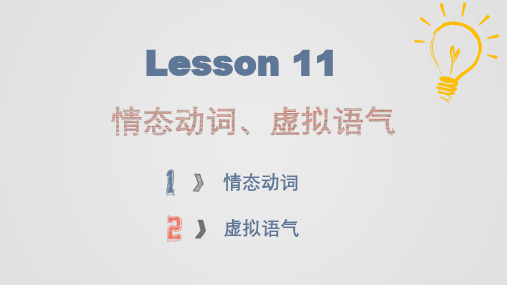
3. (Could/May) _C_o_u_l_d_ you open the window a bit, please? (表_请__求___) 4. He (can/could) _c_o_u_ld_be from America, judging by his accent.(表_推__测___) 5. (May/Can) _C_a_n__you swim?(表_能__力__)
他不敢在这么多人面前说话, 是吗? H_e_d_o_e_s_n_’t__d_ar_e_(_t_o_)_s_p_e_ak__b_e_fo_r_e__so__m_a_n_y__p_e_o_p_le_,_d_o_e_s_h_e_?_.
Exercise: 用need, dare 填空 1.—Must I stay here? —No, you _n_e_e_d_n_'t_.
高考英语语法
核心语法 边缘语法
词类 动词的时态、
语态 非谓语动词
定语从句 名词性从句
状语从句 虚拟语气 情态动词 倒装句 省略句 强调句
01 高考语法体系 03 句子成分和五种基本句型 05 主谓一致 07 定语从句 09 名词性从句 11 情态动词、虚拟语气
02 十大词类与构词法 04 动词及动词时态 06 被动语态 08 非谓语动词 10 状语从句 12 倒装句和强调句
1.7 dare
(1) dare作情态动词时, 常用于疑问句、否定句和条件从句 中, 过去式形式为_d_a_r_e_d_;否定式为_d_a_re_n_’_t _o_r_d_a_r_e_n_o_t_。 H__o_w__d_a_re__y_o_u_s_a_y_I_’_m__u_n_fa_i_r_?
超实用高考英语复习:情态动词与虚拟语气-高频考点解密

距离高考还有一段时间,不少有经验的老师都会提醒考生,愈是临近高考,能否咬 紧牙关、学会自我调节,态度是否主动积极,安排是否科学合理,能不能保持良好的心 态、以饱满的情绪迎接挑战,其效果往往大不一样。以下是本人从事10多年教学经验总 结出的超实用新高考英语专题复习讲义希望可以帮助大家提高答题的正确率,希望对你 有所帮助,有志者事竟成!养成良好的答题习惯,是决定高考英语成败的决定性因素之 一。答题时,切忌跟着感觉走,最好按照题目序号来做,不会的或存在疑问的,要做好 标记,要善于发现,找到题目的题眼所在,规范答题,书写工整;答题完毕时,要认真 检查,查漏补缺,纠正错误。总之,在最后的复习阶段,学生们不要加大练习量。在这 个时候,学生要尽快找到适合自己的答题方式,最重要的是以平常心去面对考试。英语 最后的复习要树立信心,考试的时候遇到难题要想“别人也难”,遇到容易的则要想“细 心审题”。越到最后,考生越要回归基础,单词最好再梳理一遍,这样有利于提高阅读 理解的效率。另附高考复习方法和考前30天冲刺复习方法。
表示征求意见或提出请求,多用于第二人称疑问句中。would比will语气委婉。 •Will/Would you close the window?请把窗户关上好吗?
表示习惯性动作、固有属性或必然趋势,意为“总是;习惯于”。will指现在, would指过去。•Fish will die without water. 没有水,鱼会死的。•When we worked in the same firm several years ago, we would often go to the cinema together. 几年前我们在同一家公司工作时,我们常常一起去电影院看电影。
hungry after a long walk.长途跋涉之后,你一定饿了。•Someone must have
高考英语复习 语法专题精讲精练 情态动词和虚拟语气
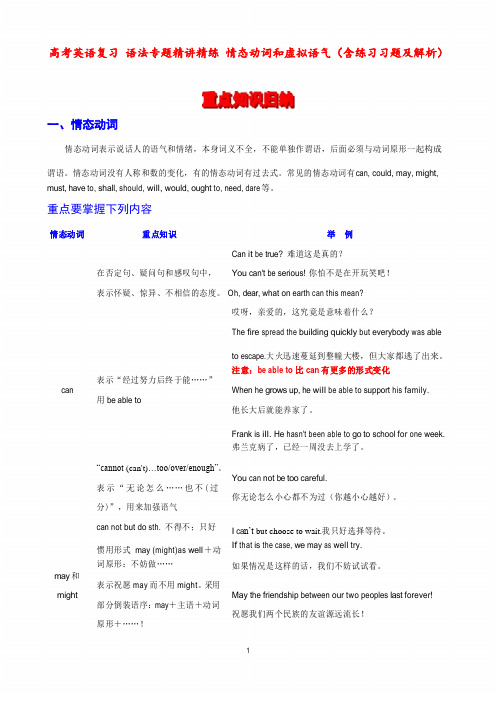
高考英语复习语法专题精讲精练情态动词和虚拟语气(含练习习题及解析)一、情态动词情态动词表示说话人的语气和情绪,本身词义不全,不能单独作谓语,后面必须与动词原形一起构成谓语。
情态动词没有人称和数的变化,有的情态动词有过去式。
常见的情态动词有c an,could,may,might, must,have to,shall,should,will,would,ought to,need,dare等。
重点要掌握下列内容情态动词重点知识举例在否定句、疑问句和感叹句中,Can it be true?难道这是真的?You can't be serious!你怕不是在开玩笑吧!can 表示怀疑、惊异、不相信的态度。
Oh,dear,what on earth can this mean?哎呀,亲爱的,这究竟是意味着什么?The fire spread the building quickly but everybody was ableto escape.大火迅速蔓延到整幢大楼,但大家都逃了出来。
注意:be able to比can有更多的形式变化表示“经过努力后终于能……”When he grows up,he will be able to support his family.用be able to他长大后就能养家了。
Frank is ill.He hasn't been able to go to school for one week.弗兰克病了,已经一周没去上学了。
“cannot(can't)…too/over/enough”。
You can not be too careful.表示“无论怎么……也不(过你无论怎么小心都不为过(你越小心越好)。
分)”,用来加强语气can not but do sth.不得不;只好惯用形式may (might)as well+动词原形:不妨做……I ca n’t but choose to wait.我只好选择等待。
英语高考知识点语法练习之情态动词和虚拟语气
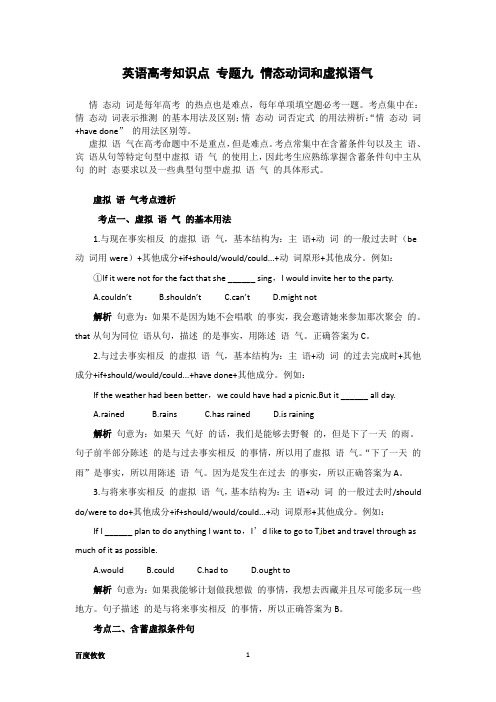
英语高考知识点专题九情态动词和虚拟语气情态动词是每年高考的热点也是难点,每年单项填空题必考一题。
考点集中在:情态动词表示推测的基本用法及区别;情态动词否定式的用法辨析:“情态动词+have done”的用法区别等。
虚拟语气在高考命题中不是重点,但是难点。
考点常集中在含蓄条件句以及主语、宾语从句等特定句型中虚拟语气的使用上,因此考生应熟练掌握含蓄条件句中主从句的时态要求以及一些典型句型中虚拟语气的具体形式。
虚拟语气考点透析考点一、虚拟语气的基本用法1.与现在事实相反的虚拟语气,基本结构为:主语+动词的一般过去时(be 动词用were)+其他成分+if+should/would/could...+动词原形+其他成分。
例如:①If it were not for the fact that she ______ sing,I would invite her to the party.A.couldn’tB.shouldn’tC.can’tD.might not解析句意为:如果不是因为她不会唱歌的事实,我会邀请她来参加那次聚会的。
that从句为同位语从句,描述的是事实,用陈述语气。
正确答案为C。
2.与过去事实相反的虚拟语气,基本结构为:主语+动词的过去完成时+其他成分+if+should/would/could...+have done+其他成分。
例如:If the weather had been better,we could have had a picnic.But it ______ all day.A.rainedB.rainsC.has rainedD.is raining解析句意为:如果天气好的话,我们是能够去野餐的,但是下了一天的雨。
句子前半部分陈述的是与过去事实相反的事情,所以用了虚拟语气。
“下了一天的雨”是事实,所以用陈述语气。
因为是发生在过去的事实,所以正确答案为A。
3.与将来事实相反的虚拟语气,基本结构为:主语+动词的一般过去时/should do/were to do+其他成分+if+should/would/could...+动词原形+其他成分。
高考英语情态动词和虚拟语气复习(完整版)
高考英语情态动词和虚拟语气复习【名师精讲必考语法,值得下载练习】情态动词是一种本身有一定的词义,后面加动词原形,给谓语动词增添情感色彩,表示说话人对有关行为或事物的态度和看法,认为其可能、应该或必要等。
一、情态动词的分类1.只做情态动词:must, can(could), may(might), ought to, should2.可做情态动词又可做实意动词:need, dare(dared)3.可做情态动词又可作助动词:shall, will(would)4.具有情态动词特征:have(had) to, used to, had better (not) do二、情态动词的特点1.情态动词没有人称和数的变化。
2. 情态动词后跟动词原形,否定式构成是在情态动词后面加“not”。
3. 情态动词属非及物动词,故没有被动语态。
三、情态动词的基本用法1.can/ could1) 表示能力Can you lift this heavy box?Mary can speak English fluently.此时可用be able to 代替。
can 只有一般现在时和一般过去式;而be able to 则有更多的时态。
I’ll be able to come this afternoon.注意:当表示“经过努力而成功做到某事时”不能用could, 而用was/were able to do= succeeded in doing= managedto doHe was able to go to the party yesterday in spite of the heavy rain.2) 表示可观可能性(客观原因形成的能力)。
译为“能够;可以”This hall can hold 500people at least.3) 某人或某物一时的可能性,常译为“有时(可能)会”It is usually warm in my hometown in March, but it can be rather cold sometimes.Little children can be very naughty.4) 表示请求和允许----- Can I go now?----- Yes, you can. No, you can’t.此时可与may 互换。
高考 情态动词和虚拟语气 知识点总结
情态动词和虚拟语气一、情态动词的用法要点1.表能力CanBe able to 表现在的能力Will be able to 表将来的能量力CouldWas/were able to 表过去的能力Could have + 过去分词表过去有能力但未做2.表推测(可能性)a.可能性分为客观的可能性和具体事情实际发生的可能性两种。
所谓客观的(理论的)可能性即并不涉及具体某事是否会发生,此种用法常常可以说明人或事物的特征情态动词can可用于肯定句中表示可观的(理论的)可能性,而表示具体事情实际发生的可能性时,can一般不用于肯定句。
b.表示具体事情实际发生的可能性①表示集体事情实际发生的可能性层次比较②表示具体事情实际发生的可能性时,may, must常用于肯定句,一般不用于否定句和疑问句(may not表示“可能不”);can常用于否定句、疑问句或感叹句中,表示疑惑、惊讶或不相信等意思;could既可用于肯定句又可用于否定句、疑问句中。
③would, could, should, might并不一定与过去时间有关,而表示可能性弱于他们相应的现在时形式④should表推测时,表示确定或可能有的未来或期望,即合乎理想的情况或结果3.表示请求、允许、允诺a.当对方是决策者时,你代表你(们)自己(I, we),或代表第三者(he, she, they)向对方(you)请示或提出建议时用:①shall/may(might)/can(could) I/we…?②shall he/she/they…?③would/will you…?b.Could/might/would/should表委婉语气c.Shall与第二、三人称连用用于陈述句,表示说话者的命令、警告、威胁;当宣布法律规定时,shall也由此用法4.表必要性a.must常用来表示必要性,以为“必须”①must + do sth. (现在或将来)必须做某事②don’t have to do sth./don’t need to do sth./needn’t do sth.(现在或将来)不必做某事③表示过去没必要做某事,分以下情况:Needn’t have done sth.本来不必做而做了某事Didn’t have to do sth./didn’t need to do sth./It was not necessary to so sth.(过去)不必做(不强调是否做了)某事b.should也可以表示必要性,意为“(义务上)应该”。
高考英语语法考点解读:情态动词和虚拟语气
情态动词主要用来表示说话人的情感、态等,是中英语语法的重点,也是高考的热点,是单项填空必考的一个知识点。
情态动词在近五高考中主要考查四点:情态动词表示推测和可能性的用法;情态动词与虚拟语气;情态动词表达“情感、态、语气等”;情态动词表示“必要性”等方面的用法。
虚拟语气的考点主要集中在名词性从句、条件句中的用法,以及错综条件句中虚拟语气的应用。
一、情态动词表推测的用法headmaster.①That maynot be true.①He couldn'thavediscovered thetruth.注意:should (ought to)表示推测是高考考查的重点和难点。
如:—When can I come for the photos?I need them tomorrow afternoon.—They ________ be ready by 12:00.A.can B.should C.might D.need【解析】B A项表示推测时常用于否定句和疑问句中。
C项表示推测语气不太肯定。
should意为“按理说,理应”,既回答了顾客的询问,不失礼貌,又为照片有可能尚未洗好,顾客到时取不到留下了回旋的余地,体现了店主的精明与用词经过仔细推敲。
二、情态动词的其他用法1.can, could, may, might2.must, should3. need, dare4.shall/will/would4.shall/will/would4.shall/will/would二、情态动词+have done四、虚拟语气虚拟语气表示说话人所说的话不是事实,而是一种假设、愿望、怀疑或推测。
1.虚拟语气在条件句中的用法If it were to rain tomorrow, I should not drive my car. 如果明天下雨的话,我就不开车了。
(明天的情况还不知道)If I had done it in time, I should have had a good time. 如果我及时做的话,日子就好过多了。
高考英语情态动词和虚拟语气讲解
(一)虚拟语气常考点(一)虚拟语气在非真实条件句中的运用使用虚拟条件句时要注意的几点:1.当条件状语从句表示的行为和主句表示的行为所发生的时间不一致时,被称为“错综时间条件句”,动词的形式要根据它所表示的时间做出相应的调整。
如:If you had studied hard before,you would be a college student now。
假如你以前学习努力的话,你现在将已是一名大学生了。
2.if省略句在条件句中可省略if,把were,had,should提到句首,变为倒装句式。
如:If I were at school again,I would study harder。
→Were I at school again,I would study harder。
假如我再次回到学校,我一定更加努力的学习。
If you had come earlier,you would catch the bus。
→Had you come earlier,you would catch the bus。
假如你来早点,你就赶上公交车了。
If it should rain tomorrow,we would not go climbing。
→Should it rain tomorrow,we would not go climbing。
假如明天下雨,我们就不去爬山了。
注意:当省略的条件句中的谓语动词是否定形式时,不能用动词的缩略形式。
比如,我们可以说:Were it not for the expense,I would go abroad now。
但不能说:Weren’t it for the expense,I would go abroad now。
3.用介词短语代替条件状语从句。
常用的介词有with,without,but for。
如:What would you do with a million dollars?(=if you had a million dollars)假如你有一百万美元的话,你会做什么?We couldn’t have finished the work ahead of time without your help。
- 1、下载文档前请自行甄别文档内容的完整性,平台不提供额外的编辑、内容补充、找答案等附加服务。
- 2、"仅部分预览"的文档,不可在线预览部分如存在完整性等问题,可反馈申请退款(可完整预览的文档不适用该条件!)。
- 3、如文档侵犯您的权益,请联系客服反馈,我们会尽快为您处理(人工客服工作时间:9:00-18:30)。
专题七情态动词和虚拟语气常考点近两年考查情态动词和虚拟语气的频率呈上升趋势。
从整体上把握情态动词的语法特征和语义特征,能够准确理解不同情态动词的细微差异,认真区别具有相同功能、意思相近的情态动词的用法,在真实的交际情景中印证和领悟情态动词的用法和特征。
1情态动词所表示的多种含义1. can和could的用法①表示能力。
如:I can run fast.②表示客观可能性。
如:An experienced driver can have an accident at times.③表示请求和允许。
用could 语气更委婉。
如:—Can/Could I go now?—Yes,you can.④表示猜测、惊异、怀疑、不相信的态度(主要用于否定句、疑问句或惊叹句中)。
如:Can this be true?How can you be so careless!This cannot be done by him.2. may和might的用法①表示许可。
如:You may drive the car.—May/Might I use your pen?—No,you mustn't.②用于祈使句中表示祝愿。
如:May you succeed!③表示推测、可能(疑问句不能用于此意)。
表推测的might并不是指过去时间,而表示比may把握性略小些。
如:He may be very busy now.④用于表示目的或让步状语从句中。
如:No matter what difficulties you may come across,you shouldn't give up.3. will和would的用法①用于各种人称,表示“意志”“意愿”“决心”等。
如:I told her to stop crying,but she just would not listen.②用于第二人称的疑问句,表示说话人向对方提出请求。
用would比用will语气更客气。
如:Will/Would you please keep the door open?③表示真理或习惯,意为“惯于,总是”。
如:She will listen to music alone in her room for hours.He would get up early when he lived in the country.4. should的用法①表示现在或将来的责任或义务,意为“应该,应当”,这时它可以和 ought to,be supposed to 互换使用。
如:You should(=are supposed to ) complete your test in time.②表示有较大可能实现的猜测、推论,通常意为“可能;总该……吧”,相当于 be expected to。
如:They should be home by now,I think.③用于第一人称时可以表示说话人的一种谦逊、客气、委婉的语气。
如:I should think it would be better to try it again.④用在条件状语从句中,表示语气较强的假设,意为“万一”,这时也可将should置于从句之首,即将should放在主语前面,而省略从属连词if,主句谓语却不一定用虚拟语气。
如:Should I (=If I should) be free tomorrow I will come.⑤用来表示意外、惊喜或者在说话人看来是不可思议的。
尤其在以 why,who,how 等开头的修辞疑问句或某些感叹句中常常意为“竟会,居然”。
如:A gentleman like him should be rude to a lady!⑥用于虚拟语气句中(略)。
5. ought to的用法表示应该、推测,相当于should。
如:You ought to take care of him.6. shall的用法①用于第二、三人称,表示说话人的意愿,有“命令”“警告,威胁,强制”“法令条文规则”和“允诺”等意思。
如:You shall have the book when I finish reading.(表允诺)②在疑问句中,shall用于征求对方的意见或请求指示,常用于第一、第三人称。
如:Shall we go out for a walk?Where shall he wait for us?7. must的用法①表示义务、意图或建议,意为“必须,应该,禁止(用于否定句中)”。
如:You must go and see that film—you'd really enjoy it.②表示推测,意为“必定,一定”。
[注]must表示推测时的否定式是can't或couldn't(不可能)。
③表示主张,意为“硬要,一定要”。
如:If you must go,at least wait till the rain stops.④表示与说话人愿望相反,意为“偏要”。
如:The machine must break down at this busy hour.8. need和dare的用法①need 作“必要”讲时,既可作情态动词,也可作实义动词。
作实义动词时后面的动词不定式要带to,其变化与一般动词相同。
作情态动词时,仅用于否定句或疑问句中。
②dare作为情态动词时,仅用在疑问句、否定句和条件从句中。
dare若作实义动词,后面可接带to的不定式,此时to也可以省略。
dare与need的用法相似。
如:He dares to go there alone.He needs to go there alone.She doesn't dare (to) ask her father.She doesn't need to ask her father.He daren't speak English before such a crowd,dare he?9. used to的用法used to表示过去的习惯动作或状态,现在已不存在,在间接引语中,其形式可不变。
在疑问句、否定句、否定疑问句或强调句中,可有两种形式。
疑问句·Did you use to go to the same school as your brother?·Used you to go to the same school as your brother?否定句·I usedn't to go there.·I didn't use to go there.否定疑问句·Usen't you to be interested in the theatre?·Didn't you use to be interested in the theatre?其反意疑问句或简略回答中,也有两种形式:She used to be very fat,didn't she?(正式)/use(d)n't she? (口语)—Used you to get up early in the morning?—Yes,I did(正式)./Yes,I used to.(口语)10. would rather (not) do 宁愿(不)做11. had better (not) do 最好(不)做①I ________ often go fishing when I lived in the countryside.A. shouldB. wouldC. couldD. might②I've decided to take the job and I ________ change my mind.A. mustn'tB. can'tC. won'tD. may not③“Whatever you want,you ________ have it on condition that you get the best result,” said the boss.A. wouldB. ought toC. shallD. could④—Why ________ you stay in the countryside,where it's not convenient to go shopping?—But I've found it rather valuable for my health.A. canB. mustC. mayD. shall⑤—I promise her daughter ________ get a nice present on her birthday.—Will it be a big surprise to her?A. shouldB. mustC. wouldD. shall⑥She just couldn't believe that her husband,to whom she had been loyal for so many years,________ desert her after he became rich.A. mightB. shouldC. shallD. must⑦—A Mr. Smith is waiting outside for the appointment with you. ________ he come in?—Yes,please let him in.A. ShallB. MayC. WillD. Need⑧He is always on time for work. How ________ it be that he was late yesterday?A. canB. mightC. mayD. must⑨—Lucy doesn't mind lending you her dictionary.—She ________. I've already borrowed one.A. can'tB. mustn'tC. needn'tD. shouldn't【答案】①B②C③C④B⑤D⑥B⑦A⑧A⑨C2表示“推测”的情态动词肯定句中用must,may,might,could,当表示理论上的可能性时也可用can;否定句中用can,may,might,could;疑问句中用can,could。
